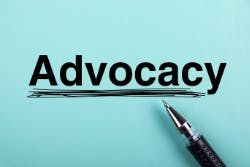Advocacy: Why hygienists should get involved with health-care politics (or any cause, for that matter)
By Amira M. Elkerdany, RDH, BA
For many dental hygienists, political advocacy may seem intimidating. However, there are basic advocacy strategies that any dental hygienist can utilize. I was lucky enough to grow up in a household where my mother taught me advocacy skills at a young age.
I remember watching my mother calling up local legislators to advocate for financial reimbursements for hemophiliac patients who contracted HIV in the late 1980s and early 1990s from tainted batches of blood clotting factor (a close family member was one of those patients). Her efforts, along with the efforts of so many other individuals, culminated in the Ricky Ray Hemophilia Relief Act of 1998.(1) My mother has always been very vocal with her opinions, and relishes the opportunity to tell legislators where they are falling short (in her eyes), and where they are succeeding.
The Statewide Parent Advocacy Network defines political advocacy as speaking or writing in support of something.(2) As experts in their field, health professionals have a responsibility to advocate for health care issues that affect the population. In fact, legislators rely on health professionals’ expertise when drafting health legislation, since health professionals have an understanding of their community’s health needs.(3)
Legislators are often unaware of issues in their community until it is brought to their attention, and sometimes just a simple letter or phone call can change the way a legislator views a particular issue. Huge advances have already been made in public health policy due to the advocacy efforts of health professionals, such as seat belt laws and tobacco regulation.(3)
‘Supporting justice and fairness’
When it comes to the oral health needs of our communities, who better to advocate for these populations than dental hygienists? The American Dental Hygienists’ Association’s Code of Ethics states that dental hygienists have a responsibility to the community and society to “promote access to dental hygiene services for all, supporting justice and fairness in the distribution of healthcare resources.”(4)
There are probably several dental hygiene issues that you feel strongly about, or perhaps you received an advocacy update from your local or state association asking for your help in pushing a piece of dental hygiene legislation forward. Advocacy can also extend beyond dental hygiene. Perhaps you feel strongly about access to health care for veterans, or making more sidewalks in your city wheel chair accessible. Or maybe you are sick of that huge pothole on your street, and if you have to change one more tire because of that pothole, you are going to scream!
Your opinion does matter
The possibilities are endless. Once you figure out what you are passionate about, the next few steps are simple.
Before moving forward, it is important to understand how our federal and state governments are structured. The United States Congress is composed of two houses—the Senate, and the House of Representatives. Similarly, state governments have two houses: a state senate, and a state house of representative or a state assembly. Nebraska is the only exception, in that Nebraska only has a state senate and no house of representatives.(5)
Legislation can originate in either house, so if there is a particular bill that you are concerned about, you need to know which house is discussing the bill. If a bill receives a majority vote in one of the houses, then the bill will go to the second house to be voted on. These are just the basics of how a bill becomes a law. If you are still confused on the process, there is a great, three-minute cartoon that might take you back to your childhood. Just search “Schoolhouse Rock I’m Just a Bill.”(6) Sometimes simple is better!
So perhaps your state association sends you an email saying that the state senate will be voting on a bill that establishes a midlevel dental hygiene provider in your state. They need your help in contacting your local legislator.
People unfamiliar with advocacy often have the misconception that their opinions do not matter. This could not be further from the truth! Those legislators want your vote in the next election, so they often feel inclined to hear what you have to say. In fact, as few as five letters or phone calls from constituents regarding one particular issue can often sway a representative’s vote.(3)
To contact and locate your local legislator, your search keywords will include the name of your state and the words “state legislature.” From there, you will find the website for both your state senate and state house of representatives. This website will contain a search engine to locate your local legislators in each branch.
If you feel compelled to locate your legislators in both branches of your state government, by all means, go for it! Using the example above, hopefully the bill will pass in the state senate, and will eventually be voted on in the state house of representatives, so contacting all of your legislators would not hurt. Also, there is no rule that says you can only contact your legislators regarding issues that they will be voting on, so if you feel passionate about a particular issue that has not been drafted into a bill, you can still contact your legislators.
The word “contact” is a vague term, and examples of how to contact a legislator may make you feel more at ease with the process. One easy way to contact a legislator is to simply send him or her an informal email. Often times, your professional organization or special interest group will develop a letter template that contains all the pertinent information regarding the issue, and you can simply copy-and-paste the template into an email and sign your name. This method is quick and convenient, and is definitely better than keeping silent.
There are more effective means of letter writing, however, and only require a few minutes of your time. Actual letters that are mailed to the legislators are usually more effective, so consider writing your own letter if time allows. To write an effective letter to your legislator, simply follow these easy steps:(7)
- Address the legislator by starting with the word “Honorable” followed by his or her full name and title (for example, Honorable Senator Smith, or Honorable Representative Smith)
- State that you are a dental hygienist and a constituent and briefly introduce the topic of concern
- If you are writing about a specific bill, state whether you support or oppose the bill
- Provide details, personal stories, summaries, or statistics regarding the issue
- Clearly state what action you want to take place
- Thank the legislator on something you liked that he or she did in the past (this takes a little bit of research by looking on the legislator’s website to see what he or she is passionate about. Regardless of political party affiliation, you are bound to find at least one issue that you both agree on)
- Close the letter by signing your full name, credentials, address, and phone number
Quite honestly, the easiest way to contact a legislator is by good-old-fashioned telephone. For those of you who feel uncomfortable reaching out this way, then sticking with a letter or email will do the trick.
I encourage you to browse the ADHA’s advocacy page under membership resources. Also, if your state association is planning a Lobby Day, ask if you can get involved to see firsthand how our professional organizations are fighting for the profession and increased access to care!
Whatever you do, just do not keep quiet! As my mother always said, “the squeaky wheel gets the grease.” In fact, she continues her political advocacy work by meeting with local legislators, and attending political protests, rain or shine!
Amira M. Elkerdany, RDH, BA, serves as adjunct faculty in the dental hygiene department at Taft College and Oxnard College, and works in both a periodontal practice and a general practice. She is currently working on her master’s of science in dental hygiene from Idaho State University and holds a bachelor of arts degree in peace and conflict studies from the University of California, Berkeley. Additionally, she served as the Past-President of the Ventura County Dental Hygienists’ Association, and can be reached at [email protected].
References
- Ricky Ray Hemophilia Relief Act, 105 U.S.C. § 1023 (1998).
- Statewide Parent Advocacy Network, Inc.(n.d.). Public policy advocacy: A grassroots guide. Retrieved fromhttp://www.spannj.org/publications/SPAN%20Grassroots%20Advocacy%20Guide.pdf
- Lachenmayr, S. (2009). Using advocacy to affect policy. In R. Bensley and J. Brookins-Fisher (Eds.), Community health education methods: A practical guide (3rd ed.)(pp.333-360). Sudbury, MA: Jones and Bartlett Publishers.
- ADHA (2016). Bylaws and Code of Ethics. Retrieved from https://www.adha.org/resources-docs/7611_Bylaws_and_Code_of_Ethics.pdfRicky Ray Hemophilia Relief Act of 1998. Retrieved from http://www.gpo.gov/fdsys/pkg/PLAW-105publ369/pdf/PLAW-105publ369.pdf
- Nebraska Legislature. Retrieved from http://www.nebraskalegislature.gov/about/history_unicameral.php
- Disney Educational Productions. (2011, December 8). Schoolhouse Rock: America – I’m Just a Bill Music Video. Retrieved from https://www.youtube.com/watch?v=FFroMQlKiag
- Community Tool Box. (2016). Section 1: Writing letters to elected officials. Retrieved from http://ctb.ku.edu/en/table-of-contents/advocacy/direct-action/letters-to-elected-officials/main







